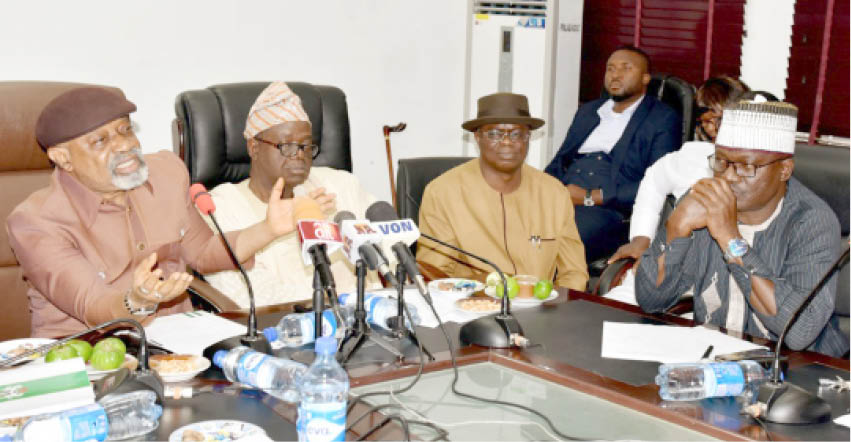Carry-over issues into Ngige’s second tenure
… sets new agenda The returning Minister of Labour and Employment, Chris Ngige, has assumed office with some outstanding from his first tenure as the minister. Ngige was at the forefront of the negotiations for the N30,000 new minimum wage that has become law. It was said that the new minimum wage would take effect […]

From left: The minister of Labour and Employment Dr. Chris Ngige, minister of state Labour and Employment Senator Tayo Alasoudura, NSITF Board chairman Prince Austin Enajemo-Isire and NPC DG Dr Kashim Akor at the Ministry of Labour and Employment recently.
… sets new agenda
The returning Minister of Labour and Employment, Chris Ngige, has assumed office with some outstanding from his first tenure as the minister.
Ngige was at the forefront of the negotiations for the N30,000 new minimum wage that has become law. It was said that the new minimum wage would take effect from April 18, 2019, when it was signed into law by President Muhammadu Buhari.
He mediated in the crises between professional associations, labour unions and the Federal Government. When medical doctors and university lecturers as well as non-teaching staff had issues with the Federal Government on agreements government failed to implement, Ngige reconvened to ensure avert any industrial disharmony.
Ngige had said the new national minimum wage “is a national law and no governor can say he will not pay. The Issue of the national minimum wage is item 34 on the exclusive legislative list of the third schedule of the Nigerian constitution.
“Every state government is now owing workers if they have not started paying N30,000. We are now in a committee working out a new template with which we will adjust upward.”
The Federal Government had on May 14, 2019 inaugurated a committee to negotiate the consequential adjustment in salaries arising from the minimum wage, with the Head of the Civil Service of the Federation, Winifred Oyo-Ita, appointed as chairman.
By the time President Buhari’s first tenure was lapsing on May 29, 2019, the Ministry of Labour under Ngige, had addressed 1,425 trade disputes and complaints; 788 disputes were completely concluded and resolved; 37 cases were referred to the Industrial Arbitration Panel and 600 cases are at various stages of mediation and conciliation.
Ngige, who resumed duty last week, disclosed that his second tenure will be committed to taming some issues bordering on unemployment, minimum wage and strengthen relationship with labour.
On the issue of unemployment, he said “through our Department of Cooperatives, which unfortunately the Ministry of Agriculture is holding today, when we get it we will ensure that all states of the federation key into it so that people can use it to be self-employed.
“Through that cooperative, jobs can be created as well as the agricultural sector and the mining sector. The National Bureau of Statistics (NBS) said the country’s unemployment rate rose from 14.2% to 18.8% in 2017. It also said that Nigeria’s labour population increased from 83.9 million in the second quarter to 85.1 million in the third quarter of 2017, a difference of 1.2 million in additional workforce.
“I am coming in with experience. We have been there for three and half years. The president evaluated our efforts and felt that we should return there. That does not mean that we are going back there to sleep or go and be making merry,” he said.
